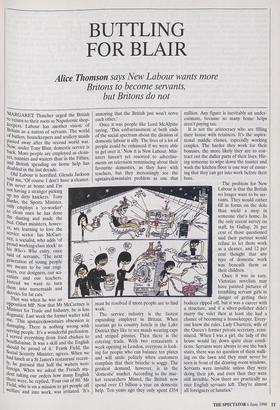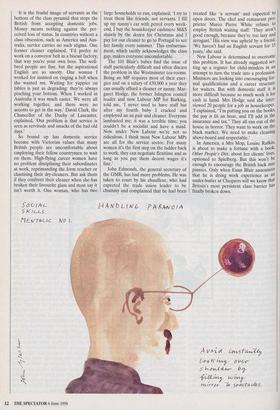BUTTLING FOR BLAIR
Alice Thomson says New Labour wants more
Britons to become servants, but Britons do not
MARGARET Thatcher urged the British to return to their roots as Napoleonic shop- keepers. Labour has another vision: of Britain as a nation of servants. The world of butlers, housekeepers and scullery maids Passed away after the second world . war. Now, under Tony Blair, domestic service is back. More people are employed as clean- ers, nannies and waiters than in the Fifties, and British spending on home help has doubled in the last decade.
Old Labour is horrified. Glenda Jackson told me, 'Of course I don't have a cleaner. T In never at home and I'm not having a stranger picking my dirty knickers.' Tony Banks, the Sports Minister, only employs a 'co-worker' to clean once he has done the dusting and made the bed. Other ministers, howev- er, are learning to love the service sector. Ian McCart- deY, a socialist, who adds 'of proud working-class stock' to his. Who's Who entry, once said of servants, 'The next generation of young people are meant to be our engi- neers, our designers, our sci- entists and our teachers. Instead we want to turn them into nursemaids and skivvies for fat cats.' That was when he was an oPposition MP. Now that Mr McCartney is Minister for Trade and Industry, he is less dogmatic. Last week the former waiter told me, 'This upstairs/downstairs obsession is damaging. There is nothing wrong with serving people. It's a wonderful profession. I served everything from fried chicken .to bouillabaisse. It was a skill and the English should be proud of it.' Frank Field, the Social Security Minister, agrees. When we had lunch at a St James's restaurant recent- ly, he guessed that half the waiters were foreign. When we asked the French stu- dent raking our orders how many English there were, he replied, 'Four out of 80. Mr Field, who is on a mission to get people off welfare and into work, was irritated. 'It's annoying that the British just won't serve each other.'
Once it was people like Lord McAlpine saying, 'This embarrassment at both ends of the social spectrum about the division of domestic labour is silly. The lives of a lot of people could be enhanced if we were able to get over it.' Now it is New Labour. Min- isters haven't yet resorted to advertise- ments on television reminiscing about their favourite domestics, as they have with teachers, but they increasingly see the upstairs/downstairs problem as one that must be resolved if more people are to find work.
The service industry is the fastest expanding employer in Britain. When tourists go to country hotels in the Lake District they like to see maids wearing caps and striped pinnies. Then there is the catering trade. With two restaurants a week opening in London, everyone is look- ing for people who can balance ten plates and will smile politely when customers complain that their brioche is soggy. The greatest demand, however, is in the 'domestic' market. According to the mar- ket researchers Mintel, the British now spend over £3 billion a year on domestic help. Ten years ago they only spent £354 million. Any figure is inevitably an under- estimate, because so many home helps aren't paying tax.
It is not the aristocracy who are filling their house with retainers. It's the aspira- tional middle classes, especially working couples. The harder they work for their bonuses, the more likely they are to con- tract out the duller parts of their lives. Hir- ing someone to wipe down the toaster and wash the kitchen floor is one way of ensur- ing that they can get into work before their boss.
The problem for New Labour is that the British no longer want to be ser- vants. They would rather fill in forms on the dole than wield a mop in someone else's home. In the only recent survey on staff, by Gallup, 26 per cent of those questioned said their partner would refuse to let them work as a cleaner, and 12 per cent thought that any type of domestic work was beneath them or their children.
Once it was so easy. Victorian novelists may have painted pictures of trembling servant girls in danger of getting their bodices ripped off, but it was a career with a structure, and if a silver-polisher didn't marry the valet then at least she had a chance of becoming a housekeeper. Every- one knew the rules. Lady Charteris, wife of the Queen's former private secretary, remi- nisced, 'When I was a girl, the lady of the house would lay down quite clear condi- tions. Servants were always to use the back stairs, there was no question of them walk- ing on the lawn and they must never be seen in front of the drawing-room windows. Servants were invisible unless they were doing their job, and even then they were still invisible. Now there are practically no nice English servants left. They're almost all foreigners or lunatics.' It is the feudal image of servants as the bottom of the class pyramid that stops the British from accepting domestic jobs. Money means nothing against the per- ceived loss of status. In countries without a class obsession, such as America and Aus- tralia, service carries no such stigma. One former cleaner explained, 'I'd prefer to work on a conveyor belt in a biscuit factory, that way you're your own boss. The well- bred people are fine, but the aspirational English are so snooty. One woman I worked for insisted on ringing a bell when she wanted me. Waiting for yuppies on tables is just as degrading: they're always pinching your bottom. When I worked in Australia it was much easier. We were all working together, and there were no accents to get in the way.' David Clark, the Chancellor of the Duchy of Lancaster, explained, 'Our problem is that service is seen as servitude and smacks of the bad old days.' So bound up has domestic service become with Victorian values that many British people are uncomfortable about employing their fellow countrymen to wait on them. High-flying career women have no problem disciplining their subordinates at work, reprimanding the form teacher or chastising their dry-cleaners. But ask them if they confront their cleaner when she has broken their favourite glass and most say it isn't worth it. One woman, who has two large households to run, explained, 'I try to treat them like friends, not servants. I fill up my nanny's car with petrol every week- end, I buy the housekeeper cashmere M&S shawls by the dozen for Christmas and I pay for our cleaner to go to Portugal to see her family every summer.' This embarrass- ment, which tacitly acknowledges the class gap, makes everyone uncomfortable. The 101 Blair's babes find the issue of staff particularly difficult and often discuss the problem in the Westminster tea-rooms. Being an MP requires most of their ener- gies and on a salary of £50,000 a year they can usually afford a cleaner or nanny. Mar- garet Hodge, the former Islington council leader and now Labour MP for Barking, told me, 'I never used to have staff but after my fourth baby I cracked and employed an au pair and cleaner. Everyone lambasted me; it was a terrible time; you couldn't be a socialist and have a maid. Now under New Labour we're not so ridiculous. I think most New Labour MPs are all for the service sector. For many women it's the first step on the ladder back to work; they can negotiate flexitime and as long as you pay them decent wages it's fine.' John Edmonds, the general secretary of the GMB, has had more problems. He was taken to court by his chauffeur, who had expected the trade union leader to be chummy and complained that he had been treated like 'a servant' and expected to open doors. The chef and restaurant pro- prietor Marco Pierre White refuses to employ British waiting staff: 'They aren't good enough, because they're too lazy and arrogant.' His view was upheld by a friend. 'We haven't had an English servant for 15 years,' she said. New Labour is determined to overcome this problem. It has already suggested set- ting up a register for child-minders in an attempt to turn the trade into a profession. Ministers are looking into encouraging for- mal qualifications and a career structure for waiters. But with domestic staff it is more difficult because so much work is for cash in hand. Mrs Hodge said she inter- viewed 20 people for a job as housekeeper. 'I explained, "I'm putting you on the books, the pay is £6 an hour, and I'll add in the insurance and tax." They all ran out of the house in horror. They want to work on the black market. We need to make cleaning above-board and respectable.' In America, a Mrs Mop, Louise Rafida, is about to make a fortune with a book, Other People's Dirt, about her clients' lives, optioned to Spielberg. But this won't be enough to encourage the British back into pinnies. Only when Euan Blair announces that he is doing work experience as an under-butler at Chequers will we know that Britain's most persistent class barrier has finally broken down.



























































 Previous page
Previous page